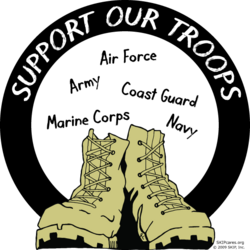History
In 2004 SKIP was founded by Tracy Stiers to honor her brother, U.S. Army Sgt(ret.) Skip Spoerke, who had deployed to Iraq. The organization started out small, sending a handful of care packages to Spoerke and his friends each month, and developed to accommodate the growing requests for care packages coming in. By the time Spoerke returned home in February 2006, SKIP was sending upwards of 75 care packages every month to deployed troops around the world. Stiers held the position of President and in 2006 Spoerke took on the position of Vice President. [1] On 25 August 2006, SKIP was established as a Massachusetts non-profit organization. [2]
Every year the Annual SKIP Dinner was held, a fundraiser dinner and dancing event filled with various raffles. Another fundraiser event that SKIP held was the Boots-in-Bars, which was the only age regulated fundraiser it held. [3] SKIP accepted donation trough igive.com and raised funds through eBay partnerships as well as recycling. It also sold "Support Our Troops" desert camouflage wearing garden gnomes. [4]
During a SKIP board of directors meeting on 18 July 2009, Skip Spoerke was elected to the position of President, after Tracy Stiers stepped down. The board also elected Karen Montagano to Assistant Treasurer and Shawna Mykes to Youth Coordinator. Resignations of board members, Heather and Jeff Jones as well as Robin and Bob Bousquet were accepted. Robin Bousquet took on a position on the SKIP Administration Committee. [1]
In July 2009, the SKIP storage facility was almost entirely empty for the first time since 2004, that is when SKIP began sending entertainment focused "Fun in a Box" care packages. [2] To help provide books to military members, SKIP partnered with author Jarrod Sadulski in July 2009. Sadulski's book 'chieving Your Educational Goals While in Military Service' was added to SKIP packages when it was purchased for donation. [5]
In September 2009, SKIP partnered with Barrett's Haunted Mansion. Visitors to the haunted mansion from Sunday to Thursday could have a discounted admission fee if they brought a qualifying item to donate for SKIP care packages. [6]
At its peak, SKIP shipped more than 1,500 care packages to deployed soldiers, sailors, airmen, and marines each year. The “Fun in a Box” care packages were some of the most requested by deployed US military members worldwide. [7] On December 31, 2011, SKIP ended its mission of sending care packages.
This page is based on this
Wikipedia article Text is available under the
CC BY-SA 4.0 license; additional terms may apply.
Images, videos and audio are available under their respective licenses.



